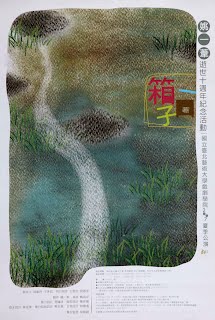Huang Mei-shu
Directing A Suitcase
The work of a director is at the same time
a kind of a translator's job. A successful translator
has to thoroughly understand the original text and the language into which
he is translating, as well as the cultural background. He has
to be capable of using the languages in question. Of course, there exist
essential differences between directing and translating literature:
the translation of a novel, a poem, or a dramatic work, for example, is
only from one language into another language – a fixed system of signs.
But if a dramatic work is to be “translated” into a stage performance,
a TV play, or a film, it has to be realized by way of specific dramatic
means , including actors, lighting, stage decoration, and sound effects.
The actor, however, usually is no passive “tool” (because he
is a living human being). This means, if the director “translates,”
he has to be aware of diverse aspects. Only thus can he realize
the spirit of the original dramatic work. Furthermore his public
is the audience, but he has know what kind of audience he has got,
for the audience is an important part of the theater: without
readers a literary work might be able to exist, but the theater cannot
continue to exist without an audience.
This is my idea regarding directing, and
this is the principle and the direction as well, according to which
I have directed A Suitcase.
A Suitcase is the shortest
play of Yao Yi-wei. It seems to be the simplest one, too. The workers
Lao-ta and Ah-san, who have had trouble with their boss, carry a suitcase
and are looking for another job. The suitcase of Ah-san is mistakenly
taken for a missing suitcase in which some radio-active material had been
kept. Because of this, Ah-san is hunted by the police and several
citizens. The stubborn Ah-san becomes a victim ofhis suitcase
when he finally falls to his death. But I think this is one of the most
interesting plays of Mr. Yao. I remember when I read the play
for the first time three years ago, it reminded me strongly of Samuel Beckett's
Waiting
for Godot and John Steinbeck's Of Mice and Men.
I don't mean by this that this play holds the same rank as these famous
texts of world drama. Rather I want to say than Ah-san and Lao-ta
show similarities with Vladimir and Estragon and with the tramps George
and Lennie as well.
In reality these three pairs in the said
plays have their own past, present and future; they are absolutely different.
I only want to illustrate, through these associations, the deep meaning
and the spirit of the time in A Suitcase.
Because of the difficulties of the play,
lack of funds and of time and due to the care, the encouragement and the
expectations of many similar-minded friends regarding our attempt,
all the players and co-workers have the feeling to shoulder a heavy
burden. But because the playwright has worked closely together
with us, we believe that the performed “translation”
will do the author justice. Even though we have not been able to
cope with all the difficulties, and though we could not reach the
level expected of us, we are convinced not to have done a “sloppy
job.”
I hope that the performance will not disappoint
the audience.
Should we experience a total failure,
one should not judge the play in terms of our production. We
hope, however, that more and more lovers of the theater
will give us criticism and encouragement and will work with
us so that we will find the courage to undertake new attempts.
Editorial note: In
1977, the bilingual (English-Chinese) journal Street / Jietou published
this article by the director, playwright and scholar Mei-shu HUANG on HUANG's
staging of Yao Yi-wei's play "A Suitcase" ( 一口箱子 , Yikou
xiangzi).
More on the Chinese playwright Yao
Yi-wei ( 姚一葦):
Huang Mei-shu, “Yao Yi-wei: A Modern
Chinese Playwright”, in: Tamkang Review # 9 / Winter 1978, pp.159-198.
See also: Duan Xin (= Iris Tuan),
“Contribution to Encyclopedia of Modern Drama—Comment on the plays
and biographies of the Three Taiwanese Playwrights—Yao, Yi-wei,
Hwang, Mei-shu, and Ma Sen,” in:
Encyclopedia of Modern Drama. Grolier:
2005.
Iris Tuan, "Contribution to The Columbia
Encyclopedia of Modern Drama—Entries of Hwang, Mei-shu, Ma Sen,
and Yao, Yi-wei." In: The Columbia Encyclopedia of Modern Drama.
2 Volumes. Edited by Gabrielle H. Cody and Evert Sprinchorn. New York:
Columbia University Press, Projected Publication in Spring 2007. ISBN:
978-0-231-14032-4.

Yao Yi-wei's A Suitcase (一口箱子
).
Book cover?
|